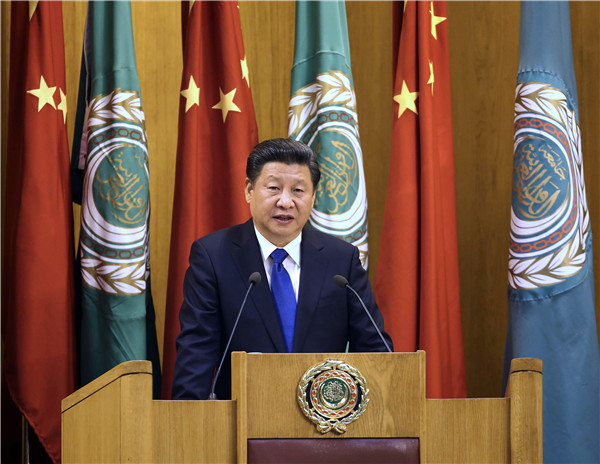
President Xi Jinping addresses the Arab League at its headquarters in Cairo on January 21, 2016, stressing the need to advance industrialization in the Middle East. (Photo: Xinhua/Pang Xinglei)
The visit by President Xi Jinping to the Middle East has fate-changing, history-making significance.[Special Coverage]
Coming right after the inauguration of the Asian Infrastructure Investment Bank, it signals the official launch and execution, as well as deeper implementation, of the Belt and Road Initiative, which has far-reaching strategic implications.
Moreover, it signals China's increasing role in affairs of the Middle East, which has an important geopolitical position, comprising the world's leading oil and gas production, and a mega-rich yet early-stage market with colossal room for further Chinese participation.
The careful and wise selection of the countries Xi has been visiting - Saudi Arabia, Egypt and Iran - has further implications.
China's influential role and positive functional contributions can be of decisive importance, while at the same time the win-win-win gains created can also be highly lucrative for all stakeholders.
China, since the beginning of the millennium, has adopted domestic and foreign policies that promote "the peaceful rise of China" and "harmonious society", chosen peacemaker as its self-appointed mission and long-term global function and adhered unwaveringly to the policy of creating stability in the global new world order. It now has the opportunity to realize its multilateral peaceful development balancer effect, and implement multi-win geopolitical, financial and commercial relations.
China's basic features of a peaceful domestic and international ancient culture and civilization, as well as its modern moderate religious and ideological policies and practices of unity in diversity and mutual peaceful co-existence, can have a positive, pacifying effect on inter-Arab and Arab-Persian relations. China's enhanced participation ultimately can lead to the creation of a well-developed and peaceful Middle East.
In addition, the bidirectional increase and multiplication of capital investments weaving the greater China region into the region will see the ultimate creation of a solid super economy. A new financial hub and capital corridor between China and the Middle East will create a new Silk Road financial capital over the next decade.
Saudi Arabia, Egypt, the Gulf Cooperation Council, other Arab countries, Iran and the whole region hold the following long-term opportunities for China: a steady and secure supply of oil and gas, now more readily available and at much cheaper prices; diverse and significant mining opportunities; investments and contract bidding for infrastructure; a second transfer of capital, technology, equipment and services in numerous sectors; industry and factory building capacities.
Although a major boost in bilateral regional collaboration is imminent in light of this historic visit, the blocks and barriers will remain solid, and for decades will impede meaningful mutual total immersion. These are what I call an "invisible great wall", not only in mindset, but also protection policies.
These include mental, habitual, cultural, linguistic and lifestyle comfort zone barriers, a lack of history of broad-based mutual participation, a lack of mutual "weaning" from the West, a lack of large-scale, top-level Arab foreign community presence in China, and deplorably close-to-zero Arab investor participation in China, and vice versa, except in Dubai, which has mostly small traders of Chinese products. There are many more elements that remain to be tackled and overcome.
Top among the corrective measures that need to happen is the vast increase and fast multiplication in mutual establishment of banking institutions and facilities.
The author Farzam Kamalabadi is president of the Future Trends International (Group) Corp, a group of companies conducting business in various regions.


















































